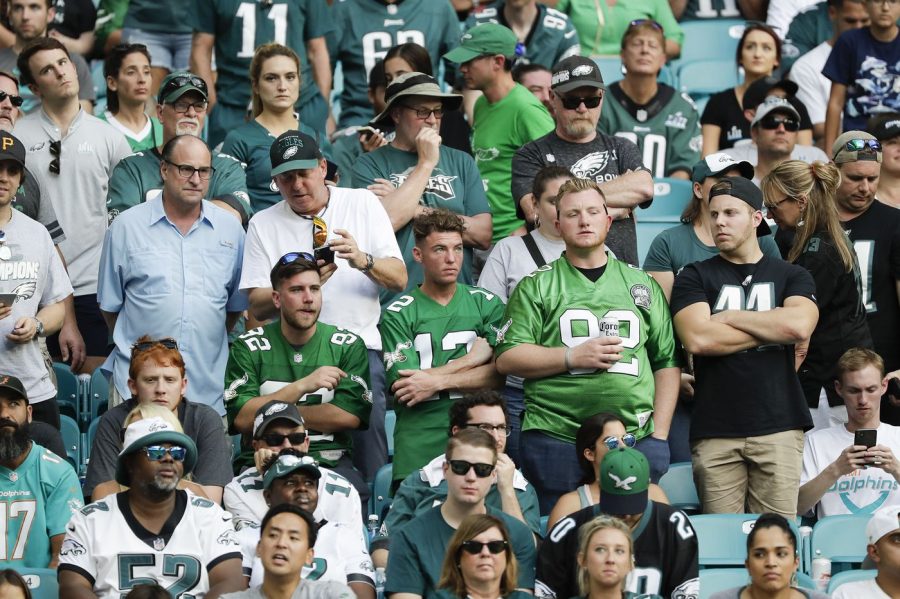Eagles’ Struggles Continue: Where Did Everything Go Wrong?
Well, this is the last thing that Eagles fans want to hear. Only two weeks into the young season, the Philadelphia Eagles have failed to show signs of life, posting an 0-2 record for the first time in the Doug Pederson era.
In 2019, all teams who initially began the first two weeks without a win failed to reach the postseason, but the Birds still believe they can turn the ship around. This includes altering one of the biggest storylines headlining the NFL: What is up with quarterback Carson Wentz?
In 2020, Carson Wentz has been the furthest thing from what General Manager Howie Roseman and the Eagles front office hoped for when they drafted him in 2016. After predominantly four years of elite playmaking and field recognition, the pro bowl QB has shocked Eagles fans, in a not so good way.
In just two games, Wentz has tossed only 2 touchdown passes to a whopping 4 interceptions, which solidifies this as the first time the QB has ever had more interceptions than touchdowns. Wentz posted a 64.4 passer-rating through the first two weeks, good for second-worst in the league, only beating out Vikings signal-caller Kirk Cousins.
Apart from that, Wentz sits only in front of Washington quarterback, Dwayne Haskins, in completion percentage (58.8%), completing 8.6% fewer passes than he has in seasons prior, and approximately 259 fewer passing yards than seasons prior, and averaging a total of 6.03 passing yards per pass attempt, a career-low. Pro Football Focus has ranked Wentz dead last in the current quarterback standings for this season.
Beyond the box score, Wentz has made questionable decisions in and out of the pocket, including a mind-boggling, tight-window throw to wide receiver JJ Arcega-Whiteside against the Rams, ultimately diminishing Philly’s chances to make a comeback. A week prior, the former second-overall pick abruptly blew the Eagles a 17-point lead to the Washington Football Team, throwing two interceptions and surrendering eight (yes, eight) sacks.
After all, this is a new-look offense, so a slow start may be expected. Chances are that Wentz and head coach Doud Pederson will regain some life as the season progresses, with a chance to finally grasp their first win against the 0-2 Cincinnati Bengals and rookie quarterback Joe Burrow.
While it is confusing that such a talented quarterback has struggled to gain his footing in his fifth year in the league, there are some factors that go into quarterback play, one of which is the offensive line.
The Eagles are known to be the polar opposite of immune to the injury bug. Last season, the Birds led all teams with the most players placed on the injured-reserve list, and only two weeks into the season, the dreadful injury bug made its expected return.
Philly has lost three of the some of the most important components of the offensive line prior to week one, including star right guard Brandon Brooks, who tore his achilles while working out, and star right tackle Lane Johnson, who missed week 1 with an ankle injury. Other offensive line injuries include former 2018 first-round selection Andre Dillard, who will miss the remainder of the season with a biceps injury.
Losing three of the five starters on the offensive line is never a good sign, which explains the Eagles’ eight sacks in week 1. Wentz is known to dance around in the pocket and extend plays to avoid pressure. Due to the lack of pass protection lost by offensive line injuries, Wentz has held onto the ball roughly 3.5 seconds longer than he should be, and his throw on the run percentage tops any other season of his career.
Quite frankly, the cleaner the pocket is, the further the quarterback tends to throw. This explains why Wentz’s 6.03 passing yards per pass attempt is the lowest the quarterback has ever averaged.
All this means is that the offensive line has failed to provide Wentz with a clean pocket, causing him to scramble more often and prevent the QB from throwing downfield.
After all, they do say that “defense wins championships”; well things got ugly on the other side of the ball as well.
In week 2’s game against the Rams, the defense allowed a total of 449 yards and roughly 6.7 yards per play, giving up 191 rushing yards and an 80% red-zone conversion rate, meaning Los Angeles scored 4 out of the 5 times they entered the Eagles’ 20-yard line.
The Eagles’ front seven, which is primarily known for disrupting the interior of the opposing offensive line, only sacked Rams quarterback Jared Goff one time, and allowed the Rams to stretch the field. Keep in mind that prior to the season, LA’s interior O-line was ranked 25th in the NFL.
Looking at the stat sheet for the defense, week 1’s performance was more ideal, but don’t be fooled. Washington was gifted the ball due to constant turnovers by the Eagles’ offense. This placed possession in the hands of the Washington offense with only short fields to work with.
This contradicts the Rams, who primarily scored their points by driving down the field. Ultimately, the Eagles’ defense got beat both ways, as both the Rams and Washington were able to shut down dominant defensive tackles Fletcher Cox and Malik Jackson.
Yes, the season is young, and Doug Pederson always has a premonition, but repeating systems that often struggle out of the gate don’t have much luck down the road. Injuries certainly are not doing the Eagles any favors, but a quarterback talent like Carson Wentz, who managed to surpass 4,000 yards in 2019 without a single receiver above 500, will hopefully find his magic touch again that Eagles fans know and love. This Sunday, the Eagles will take on the Cincinnati Bengals.

Jason is a junior and is very excited to be a member of the Harriton Banner for the second year, now as the editor of the sports section. In terms of writing,...


